Cadillac Records
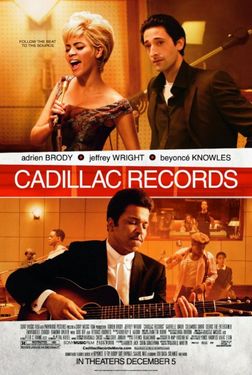
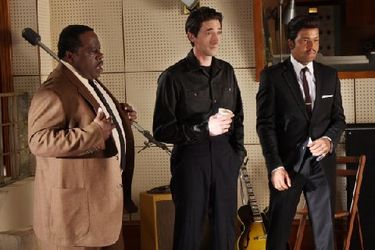 As soon as I got home, I fired up the Internet and did a quick search for Leonard Chess. It turns out that yes, he did indeed die of a heart attack, but it wasn't until months after he sold the company. This is not the only way in which writer-director Darnell Martin stretches the truth, as that same Internet search also revealed that Leonard was not the only founder of Chess Records. His brother, Phil, was right there with him but he is nowhere to be found in this movie, nor is a brother ever mentioned. Perhaps it's for the best, as if there is anything Cadillac Records does not need, it's another character. In trying to tell the story of Leonard, all the recording artists who worked for him, and how they broke barriers in the music industry, the film tries to cover too much in too short amount of time. Martin has had most of his directing experience working in television, and this film's overly loose narrative shows it. The whole project has a made for TV movie vibe that never quite grabs our attention.
As soon as I got home, I fired up the Internet and did a quick search for Leonard Chess. It turns out that yes, he did indeed die of a heart attack, but it wasn't until months after he sold the company. This is not the only way in which writer-director Darnell Martin stretches the truth, as that same Internet search also revealed that Leonard was not the only founder of Chess Records. His brother, Phil, was right there with him but he is nowhere to be found in this movie, nor is a brother ever mentioned. Perhaps it's for the best, as if there is anything Cadillac Records does not need, it's another character. In trying to tell the story of Leonard, all the recording artists who worked for him, and how they broke barriers in the music industry, the film tries to cover too much in too short amount of time. Martin has had most of his directing experience working in television, and this film's overly loose narrative shows it. The whole project has a made for TV movie vibe that never quite grabs our attention.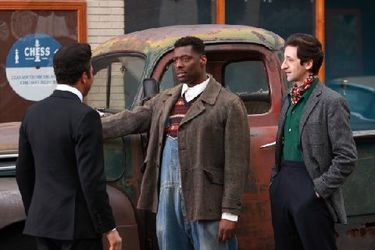 When we first meet Leonard, he's living in a shack and in a relationship with a woman who has a father that doesn't approve of him. We never see this woman again, nor do we learn the significance of her. Instead, we jump ahead to Leonard already being a club owner in Chicago where he books rising young jazz and blues talents, hoping to get them discovered. One of his first discoveries is Muddy Waters (Jeffrey Wright), who becomes a faithful member of the "Chess Family" early on. Muddy brings along with him Little Walter (Columbus Short), a violent man who will have his music career cut short due to his short temper and alcoholism in a predictable and underdeveloped story arc. Once Muddy Water's career starts to take off, the movie once again skips ahead to Leonard starting his own record label. He suddenly now has a wife and kid who come out of nowhere, only to disappear again, and his wife expresses concern over how big of a gamble the company will be. The movie keeps on doing this, jumping from each major point in life, with little to fill in-between. Faces fade in and out of the screenplay, not a single one of them creating an emotional bond with the audience.
When we first meet Leonard, he's living in a shack and in a relationship with a woman who has a father that doesn't approve of him. We never see this woman again, nor do we learn the significance of her. Instead, we jump ahead to Leonard already being a club owner in Chicago where he books rising young jazz and blues talents, hoping to get them discovered. One of his first discoveries is Muddy Waters (Jeffrey Wright), who becomes a faithful member of the "Chess Family" early on. Muddy brings along with him Little Walter (Columbus Short), a violent man who will have his music career cut short due to his short temper and alcoholism in a predictable and underdeveloped story arc. Once Muddy Water's career starts to take off, the movie once again skips ahead to Leonard starting his own record label. He suddenly now has a wife and kid who come out of nowhere, only to disappear again, and his wife expresses concern over how big of a gamble the company will be. The movie keeps on doing this, jumping from each major point in life, with little to fill in-between. Faces fade in and out of the screenplay, not a single one of them creating an emotional bond with the audience.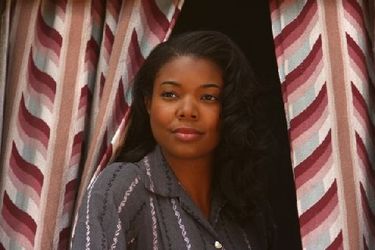 Many of those faces belong to the label's most successful recording artists. Besides the previously mentioned Muddy Waters and Little Walter, we also get glimpses into the lives of Chuck Berry (Mos Def), Etta James (Beyonce Knowles, who also serves as one of the film's producers), and Howlin' Wolf (Eamonn Walker). We're usually introduced to these people by them showing up at the company's door from off the street, then singing one of their signature songs. While the narrative may be a mess, the music in the film is first-rate. The actors create beautiful recreations of such memorable songs such as Etta James' "At Last", and Chuck Berry's "No Particular Place to Go". The music is so good, I advise you spend your money on the soundtrack CD rather than a ticket to this movie. The screenplay tries to generate some drama by focusing on the personal problems of each of these artists. For example, we learn in the movie that Etta James believed that her father was the famous pool player, Minnesota Fats, who had a one-night stand with her mother. Leonard arranges a meeting between Etta and her father, and it should be a powerful moment, but it is treated in such a curious and off-handed manner, that it hardly even registers.
Many of those faces belong to the label's most successful recording artists. Besides the previously mentioned Muddy Waters and Little Walter, we also get glimpses into the lives of Chuck Berry (Mos Def), Etta James (Beyonce Knowles, who also serves as one of the film's producers), and Howlin' Wolf (Eamonn Walker). We're usually introduced to these people by them showing up at the company's door from off the street, then singing one of their signature songs. While the narrative may be a mess, the music in the film is first-rate. The actors create beautiful recreations of such memorable songs such as Etta James' "At Last", and Chuck Berry's "No Particular Place to Go". The music is so good, I advise you spend your money on the soundtrack CD rather than a ticket to this movie. The screenplay tries to generate some drama by focusing on the personal problems of each of these artists. For example, we learn in the movie that Etta James believed that her father was the famous pool player, Minnesota Fats, who had a one-night stand with her mother. Leonard arranges a meeting between Etta and her father, and it should be a powerful moment, but it is treated in such a curious and off-handed manner, that it hardly even registers.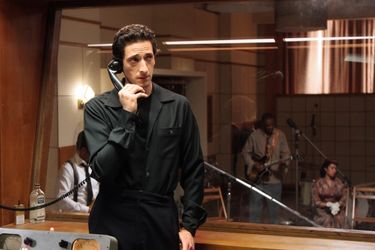 This keeps on happening, to the point that I was getting frustrated. There's a potentially powerful moment when Muddy Water's wife (Gabrielle Union) discovers her husband has been seeing other women when one of those women arrives at her house and drops off her baby, saying Muddy is the father and she can't take care of it anymore. Again, a chance for drama is ignored, as we never truly learn what the wife thinks of this. She decides to stay faithful to her husband and look after the baby as if it were her own, but we never truly learn why. It just happens, and then we move on. We also learn very little about the company itself. We learn how it received its nickname, by the fact that Leonard would give his most famous artists a free Cadillac car when they hit it big. We also learn that many of the singers who worked for the label broke the color barrier back in the 50s and 60s, but that's about all we do learn. Cadillac Records casts its net too wide, trying to cover too many topics, too much history, and too many people. If it had just focused on one person or one particular story, this could have been an emotional story. We constantly feel like we're getting the short end of the stick, and never the whole story.
This keeps on happening, to the point that I was getting frustrated. There's a potentially powerful moment when Muddy Water's wife (Gabrielle Union) discovers her husband has been seeing other women when one of those women arrives at her house and drops off her baby, saying Muddy is the father and she can't take care of it anymore. Again, a chance for drama is ignored, as we never truly learn what the wife thinks of this. She decides to stay faithful to her husband and look after the baby as if it were her own, but we never truly learn why. It just happens, and then we move on. We also learn very little about the company itself. We learn how it received its nickname, by the fact that Leonard would give his most famous artists a free Cadillac car when they hit it big. We also learn that many of the singers who worked for the label broke the color barrier back in the 50s and 60s, but that's about all we do learn. Cadillac Records casts its net too wide, trying to cover too many topics, too much history, and too many people. If it had just focused on one person or one particular story, this could have been an emotional story. We constantly feel like we're getting the short end of the stick, and never the whole story.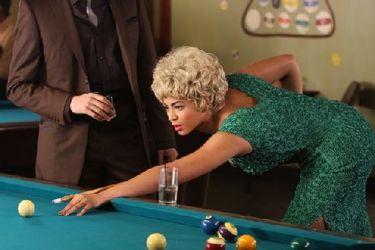 The performances here are a mixed bag, with the weakest unfortunately being right at the very center. Adrien Brody seems to wander through his scenes, chain smoking or nodding his head in approval as we hear his latest hit song. He never gets to come across as a character or a real person, so we wonder why we're supposed to care about him. The underwritten screenplay gives us no reason to. The people who work for him come off much better, with Jeffrey Wright and Beyonce Knowles being two particular standouts. Even if their personal storylines seem rushed and unfocused, they still give very emotional performances, and are able to perform their musical numbers flawlessly. Also impressive is Mos Def's portrayal of Chuck Berry, mainly because he comes across as the most energetic and fun of all the characters in the film. It's a shame that the screenplay sets him up then completely forgets about him, never really giving his story proper closure, except for a couple words that pop up on the screen before the end credits, stating what happened in the years to come to everyone.
The performances here are a mixed bag, with the weakest unfortunately being right at the very center. Adrien Brody seems to wander through his scenes, chain smoking or nodding his head in approval as we hear his latest hit song. He never gets to come across as a character or a real person, so we wonder why we're supposed to care about him. The underwritten screenplay gives us no reason to. The people who work for him come off much better, with Jeffrey Wright and Beyonce Knowles being two particular standouts. Even if their personal storylines seem rushed and unfocused, they still give very emotional performances, and are able to perform their musical numbers flawlessly. Also impressive is Mos Def's portrayal of Chuck Berry, mainly because he comes across as the most energetic and fun of all the characters in the film. It's a shame that the screenplay sets him up then completely forgets about him, never really giving his story proper closure, except for a couple words that pop up on the screen before the end credits, stating what happened in the years to come to everyone.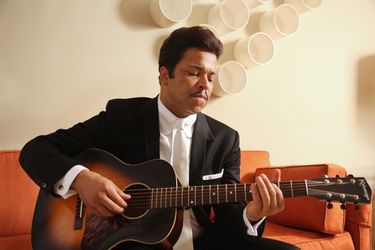
See the movie times in your area or buy the DVD at Amazon.com!






0 Comments:
Post a Comment
<< Home